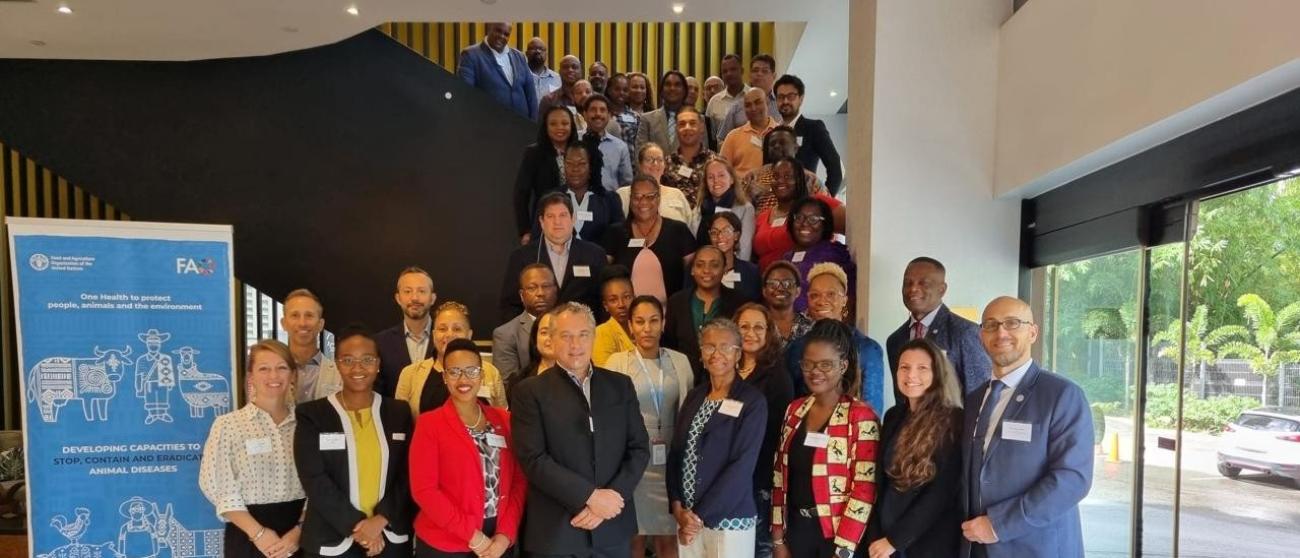FAO and Partners Strengthen Caribbean Resilience to Animal Health Emergencies

FAO, CaribVET, and CAHFSA hosted a workshop in Trinidad to boost Caribbean animal health emergency preparedness, emphasizing a One Health approach.
The Food and Agriculture Organization of the United Nations (FAO), the Caribbean Network of Animal Health and Veterinary Public Health (CaribVET) and the Caribbean Agricultural Health and Food Safety Agency (CAHFSA), in close collaboration, successfully implemented an emergency preparedness workshop in Port of Spain, Trinidad and Tobago, from 21-24 October 2024.
The workshop was attended by over 40 participants, including veterinarians and professionals from 20 Caribbean countries and territories and representatives from sub-regional and regional animal health, public health, livestock and academic veterinary institutions and organizations. Participants came together with the collective goal of enhancing key emergency management areas from a regional perspective.
The workshop was the first step in a progressive and collaborative process among FAO and Caribbean countries and organizations to enhance animal health emergency preparedness in the region, as the importance of coordinating emergency management activities when working on animal health diseases and other threats is widely recognized by countries and relevant organizations.
The four-day workshop, which was an initial step in FAO and partners supporting the region to bolster its emergency preparedness capacity from a One Health perspective, aimed to strengthen opportunities for improvement regarding regional emergency preparedness capabilities, which were identified during a previous regional self-assessment exercise carried out through the FAO Progressive Pathway for Emergency Preparedness (PPEP).
The involvement of CaribVET and CAHFSA was essential, as those organizations lead coordination and harmonization of animal health-related activities in the Caribbean and collaborate closely with organizations such as FAO, the World Organization for Animal Health (WOAH) and the Inter-American Institute for Cooperation on Agriculture (IICA). The PPEP incorporates the broad lines presented in the Good emergency management practice: The essentials manual (GEMP) developed by FAO EMC, which lays out the essential principles to be followed by the competent authorities as they develop a coherent emergency management system.
The workshop was also attended by the newly appointed Chief Veterinary Officer (CVO) of Trinidad and Tobago, Dr Lisa Musai, who emphasized that the workshop allowed her to gain a better perspective on the country and region’s status in terms of emergency preparedness, and what remains to be done. “I can now start giving priority to and focusing on the areas where we have the biggest gaps so that we can be more prepared,” noted Dr Musai.
FAO colleagues from the Regional Office of Latin America and the Caribbean, the Sub-regional Office of the Caribbean, and the FAO Emergency Management Centre (FAO EMC) at FAO headquarters together with CAHFSA and CaribVET led various focused sessions over the course of the week, providing practical guidance and support through lessons, real-life examples, group discussions, template examples and practical exercises. The sessions covered areas of emergency management such as inter-sectoral coordination, planning for animal health emergencies, testing animal health emergency management systems (EMS), monitoring, audit and review of animal health EMS and risk communication.
The focus of the workshop was carefully curated to match the pre-identified needs of the region. Due to a variety of factors, such as population growth, intensification of global livestock and animal products trade, habitat disturbance, and climate change, the emergence, re-emergence and spread of animal health threats is happening at a higher rate than ever before. These animal diseases impact livestock production, economies, public health and livelihoods, disproportionately affecting more vulnerable countries such as island states with a less developed emergency system.
A systematic approach to dealing with animal health emergencies at country and regional levels can ensure the right amount of preparedness, prevention, detection, and response of the national veterinary services to mitigate the impact of the potential emergencies while enhancing the recovery pathways.
Following this workshop, the participants are now equipped to contribute to improving knowledge and capacity in the Caribbean on inter-sectoral coordination, emergency preparedness planning, and testing of emergency management tools to revise their national legal and technical frameworks and promote upgrades to their systems under a One Health approach.
“This workshop was just the tip of the iceberg, and as we go deeper into the work we will look to further collaborate, and we will need further preparation and assistance. It’s a great start and we look forward to more support of this kind going forward,” commented Dr Kofi Sylvester, acting CVO for Saint Kitts and Nevis.
In the final stages of the workshop, country participants proposed national and regional priorities to improve emergency preparedness to animal health threats for FAO and other organizations in the region to support. Regional priorities included emergency resource mobilization, sub-regional biosecurity approach, regional laboratory networks, regional plans and procedures, regional communication and advocacy, training programmes, disease surveillance, regional network of experts and emergency human resource mobilization.
This workshop was made possible thanks to the generous support of USAID.


